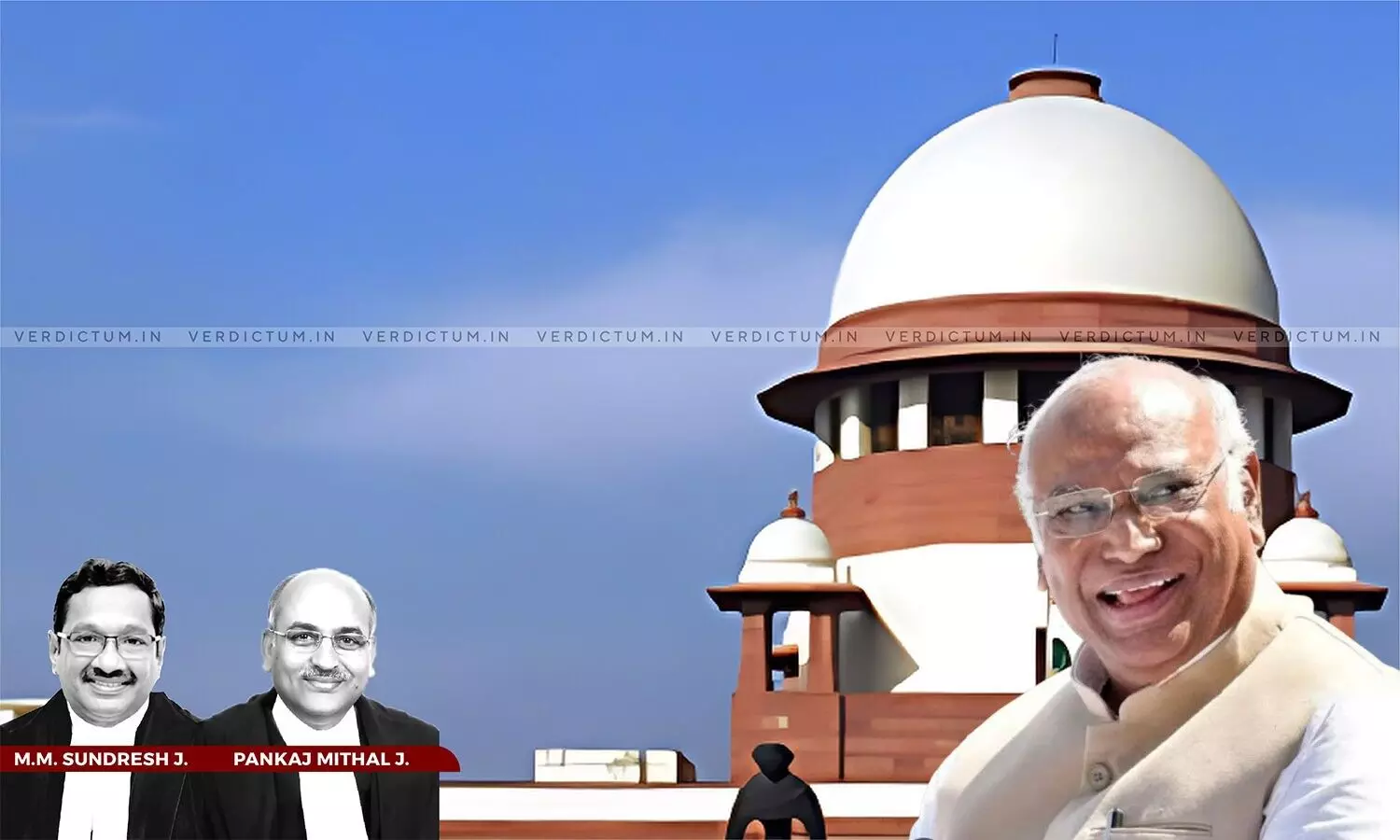
Supreme Court Stays Further Investigation Into FIR In Karnataka Against Man For Calling Congress President Mallikarjun Kharge 'Ayogya'
 |
|The Supreme Court today stayed further investigation into an FIR registered in Karnataka against a man who is accused of using the word "Ayogya" (meaning "worthless" or "rascal") in reference to the President of the All India Congress Committee (AICC), Mallikarjun Kharge.
The Court was considering an SLP filed against the Judgment of the Karnataka High Court by which the offences registered under the Scheduled Caste and Scheduled Tribe (Prevention of Atrocities) Act, 1989 against the Petitioner were quashed, but offences under Sections 153-A, 153-B, and 505(2) of the Indian Penal Code (IPC) were not.
The Bench of Justice MM Sundresh and Justice Pankaj Mithal passed the interim order in the SLP. Senior Advocate Aruna Shyam appeared for the Petitioner Mithun Shet.
On September 27, the Karnataka High Court quashed charges under the SC/ST Act against the man. However, the Court had allowed the investigation to proceed under Sections 153-A, 153-B, and 505(2) of the Indian Penal Code (IPC), which deal with promoting enmity and inciting violence.
The case originated from a speech delivered by the petitioner at a public event in Siravara, Raichur, Karnataka, where the controversial remark was allegedly made. The President of the District Congress Committee filed a complaint alleging that the word "Ayogya" was used against Kharge with the intent to incite hatred and violence based on caste, portraying the victim as a cheater. This led to an FIR being lodged, initially in Kalaburgi and later transferred to Raichur.
"The Petitioner, during a speech, in one of the Programme at Siravara, Raichur, Karnataka, had used the word “Ayogya” for the President of the All India Congress Committee (AICC). The Respondent No. 2 lodged a complaint with the Police alleging that the said word was used to incite hatred and violence towards the caste of the victim so as to create intimidation by falsely portraying him as a cheater and requested to take action against the Petitioner. Subsequently, an FIR in Crime No. 12/2024 was registered at P.S Brahmpur, Kalaburgi District which was eventually transferred at P.S Sirawar, Raichur District as Crime No. 08/2024 upon an order dated 22.01.2024 passed by the Learned District and Sessions Court, Kalaburgi. The FIR was registered under sections 153-A, 153-B, 505(2) of the Indian Penal Code and section 3(2)(v-a) of the SC and ST (Prevention of Atrocities) Act," the SLP reads.
The petitioner had approached the Karnataka High Court seeking to quash the FIR, arguing that the term "Ayogya" does not meet the criteria for an offence under the IPC sections in question. The High Court quashed the charges under the SC/ST Act but retained the IPC charges, interpreting "Ayogya" as "rascal," which the petitioner challenged.
In the SLP, the petitioner has contended that the High Court erred in its interpretation of the word "Ayogya," arguing that it should be understood as "worthless" and not "rascal." Furthermore, the petitioner argued that the ingredients for charges under Sections 153-A, 153-B, and 505 of the IPC were not fulfilled, as there was no promotion of disharmony or enmity between groups.
"The word “Ayogya” has several synonyms and one of the closest meaning is ‘worthless’ and the Hon’ble High Court has erred in chosing the meaning only as ‘rascal’. The Hon’ble High Court has erred in not appreciating that use of expression “Ayogya” in the facts of the present case," the SLP reads.
The petitioner has also raised questions about whether the mere use of the word "Ayogya" could incite violence or cause public disorder, citing precedents from the Supreme Court. Notably, the petitioner referred to cases like Ramesh S/o Chota Dalal vs. Union of India (1988) and Balwant Singh vs. State of Punjab (1995), which emphasize that words must be of a nature to incite violence or public disorder to attract charges under these sections.
The petitioner has further questioned whether Congress party followers or fans could constitute a "group or community" under Section 153-A of the IPC and whether the interpretation of the High Court contradicted established legal principles, such as those laid down in Manzar Sayeed Khan vs. State of Maharashtra (2007).
Cause Title: Mithun Chakravarty Devidas v. The State of Karnataka [SLP(Crl) No. 014305 /2024]